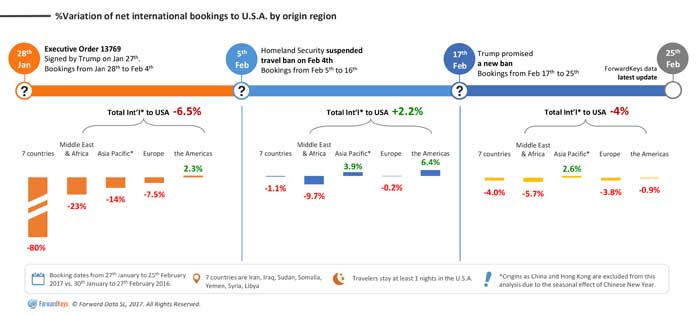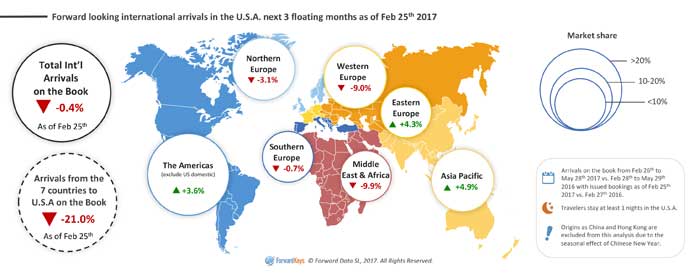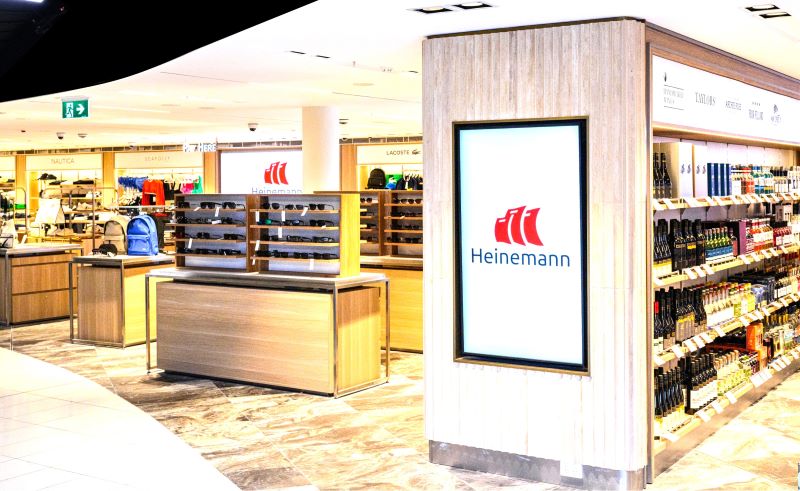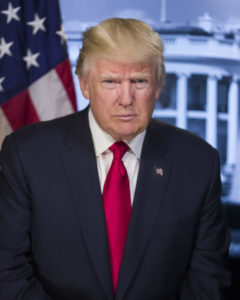 USA/MIDDLE EAST. US bookings for travel to the Middle East have collapsed in the wake of President Trump’s travel ban, according to analyst ForwardKeys.
USA/MIDDLE EAST. US bookings for travel to the Middle East have collapsed in the wake of President Trump’s travel ban, according to analyst ForwardKeys.
CEO Olivier Jager said the exact reason for the “substantial” -27% year-on-year decrease in bookings to the Middle East in the four weeks following the President’s executive order, which was announced on 27 January, was not known. Bookings had been up +12% in the three weeks before the ban, which was later blocked in US courts.
“We suspect that US citizens may be avoiding travel to Islamic countries, fearing that they will not be welcome, or that Muslims based in the USA may be avoiding travel fearing re-entry problems or both,” he theorised.
ForwardKeys previously noted that the ban had impacted travel from the seven affected countries (Iraq, Syria, Iran, Libya, Somalia, Sudan and Yemen) to the USA. Total international travel to the USA fell by -6.5% in the wake of the executive order. The intervention by the courts a week later to strike down the ban triggered a recovery, only for bookings to the USA to slump again when President Trump promised a new ban. A second executive order has been signed today (6 March), with Iraq removed from the list of countries contained in the previous seven-nation order.
ForwardKeys shared its analysis of the negative impacts of the travel ban on the US travel industry with the White House prior to the new ban coming in to force.
The information was sent by email to Deputy Press Secretary Lindsay Walters on 3 March by Tarsh Consulting, ForwardKeys’ PR adviser.
“The information provided to the White House makes it clear that the travel ban has damaged the US travel industry,” Jager said.
“When Donald Trump issued the first travel ban, he did not have access to ForwardKeys’ data; however, we sent our analysis to Lindsay Walters personally on Friday, so it would be reasonable to assume Donald Trump’s administration was aware of our findings before implementing the new ban.”
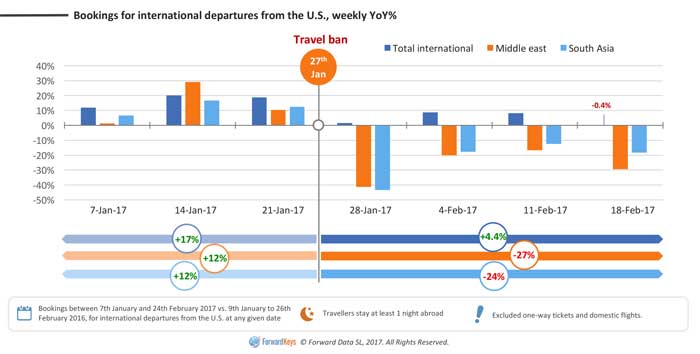
Bookings for future arrivals are effectively flat, ForwardKeys said.
The company also noted that bookings to South Asia followed a similar pattern to the Middle East; up +12% before the ban and down -24% in the four weeks after. Following UNWTO, ForwardKeys’ geographic definition puts Iraq, Yemen and Syria in the Middle East and Iran in South Asia.
As a benchmark, ForwardKeys said total outbound bookings from the USA made during the peak January booking season, prior to the imposition of the travel ban, were unusually healthy (+17%). It said the surge was likely driven by “pent-up demand” for travel to Europe, which was negatively affected in 2016 by a series of terrorist incidents. In the four weeks after the imposition of the ban, the rise in total outbound bookings had fallen back to +4.4%.

Looking at bookings for future travel during the upcoming three months (March-May) there has also been a “significant stall” in bookings from the USA to the Middle East and South Asia, according to ForwardKeys. On 27 January forward bookings for travel to the Middle East were +23% ahead of the same point last year but by 28 February had fallen to -2.4% behind. Bookings for travel to South Asia during the March-May period were +8.8% ahead prior to the imposition of the ban and down -6.6% by 28 February. As a benchmark, overall USA outbound travel for the next three months is +11% ahead, but prior to the ban it had been an even healthier +20% ahead.
“Whether the overall slowdown in forward bookings has been caused by the travel ban is debatable – it could simply be the consequence of an unusually strong peak booking season in January,” concluded ForwardKeys. “However, the collapse in bookings to the Middle East is very difficult to explain without reference to the travel ban.”
Jager said: “Donald Trump’s on-off travel ban has created a rollercoaster ride for the travel industry. Some passengers do not know where they stand as they await [his] promised new order. It’s not at all clear when that will come. In the meantime, uncertainty reigns and the presidential rhetoric appears to be deterring visitors to the USA.”
